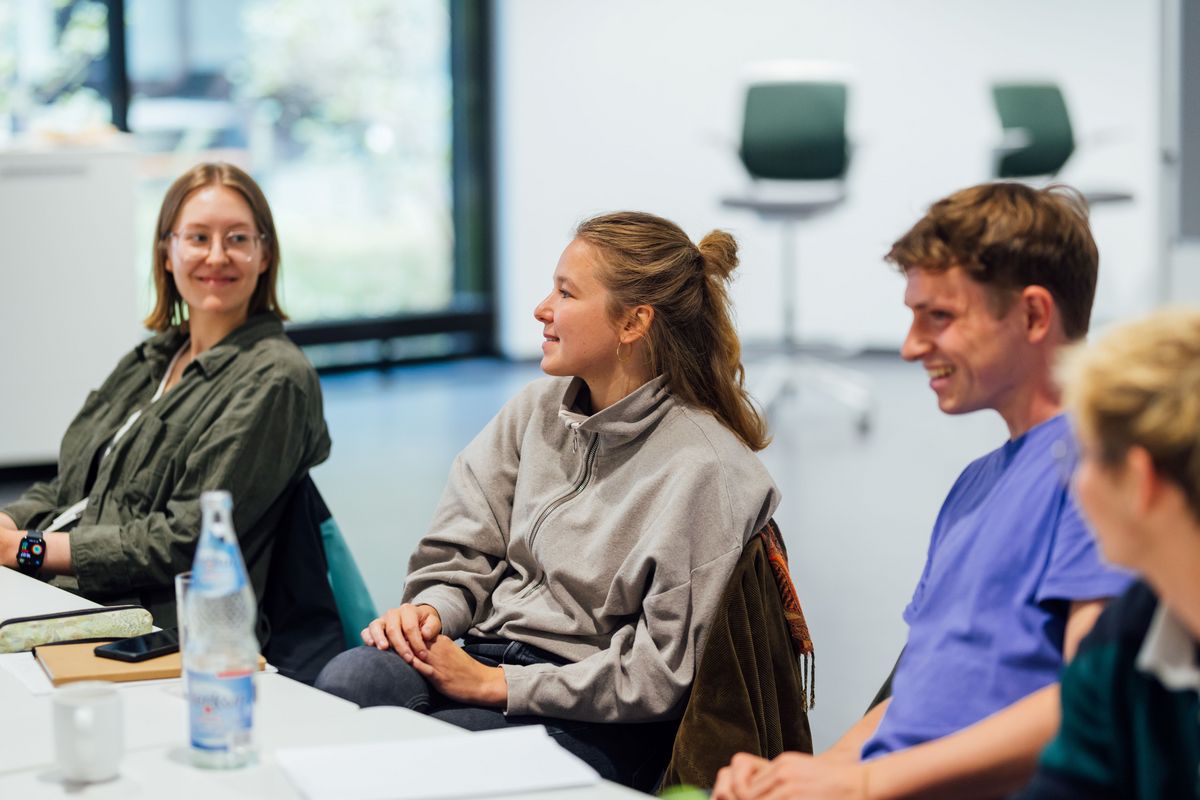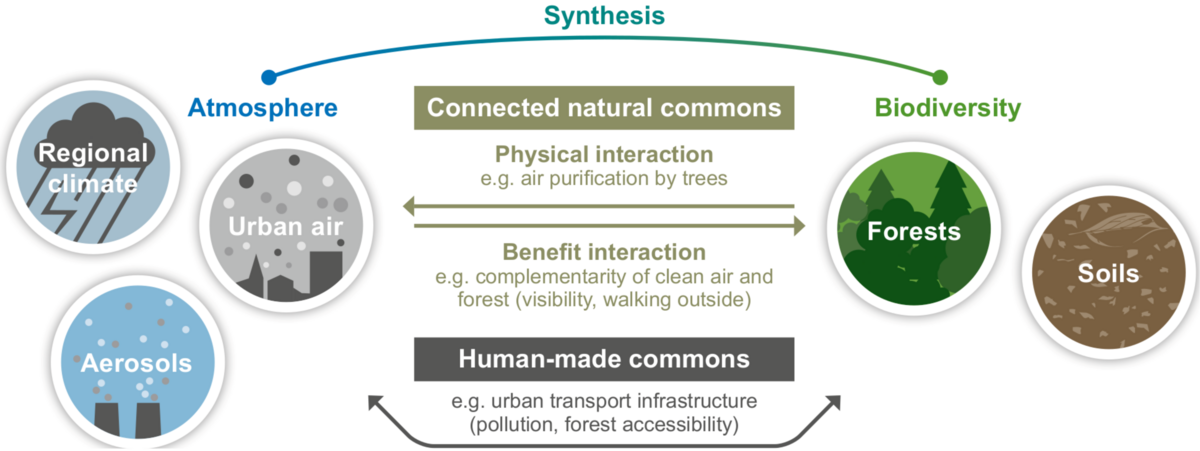The Research Training Group 2939 “Economics of Connected Natural Commons: Atmosphere and Biodiversity (ECO-N)” is funded by the German Research Foundation (DFG) with around 7 million Euro for 5 years.
Starting in September 2024, ECO-N will provide up to 40 doctoral researchers in two cohorts with an excellent research and qualification environment. ECO-N will train a new generation of sustainability researchers to develop both an excellent command of quantitative research methods for understanding specific natural or human-made commons and adopt a systemic perspective on connected natural commons and the challenges of sustainable development.
Overview
The Research Training Group 2939 “Economics of Connected Natural Commons (ECO-N)” will provide a scientific and academic training environment that is embedded in an excellent international scientific network. A new generation of sustainability researchers will be trained to develop both an excellent command of quantitative research methods for understanding specific natural or human-made commons and adopt a systemic perspective on connected natural commons and the challenges of sustainable development.
A special focus of ECO-N training is put on the challenges of collaborative research between disciplines. Sustainability challenges such as biodiversity loss, climate action failure, natural resource crises, urban air pollution, the ‘Waldsterben 2.0’, and overfishing are of prime concern in the public and political discourse. Central to these sustainability challenges are natural and human-made commons. In the broad definition we use, commons (also common pool resources, common goods) include any type of natural or human-made resource system for which it is difficult to exclude others from access, and where the use by one individual affects the benefit others receive (e.g. in case of a fish population) or the damage others suffer (e.g. in case of polluted urban air).
The use of natural commons is a prime example for a social dilemma situation in which individual and social rationality diverge: Economic decisions in the best self-interest lead to over-use of natural commons and ultimately to a worse outcome for many users of the same commons. Economic theory has made major contributions to our understanding of commons problems, highlighting the role of externalities and resulting market failures. For some natural commons, ways have been found to deal with the social dilemma situation and to improve the outcomes for many beneficiaries. For example, environmental regulations in countries like Germany have substantially decreased air pollution with aerosols since the 1980s. Yet, commons problems have not diminished, as the increasing concern about sustainability challenges shows.
The United Nations have set 17 Sustainable Development Goals (SDGs), several of which concern natural commons, including clean water (SDG 6), the ocean (SDG 14), climate (SDG 13), and life on land (SDG 15), or human-made commons such as energy systems (SDG 7) and infrastructure (SDG 9).
A key challenge is that, as our understanding of the commons has become more complex, we increasingly recognize that more sophisticated policy responses are required to address problems that are characterized by uncertainty, spatial and temporal heterogeneity, and long duration. Addressing these characteristics requires a profound scientific understanding on how the natural commons work– at a fundamental level and in their economic perspective. ECO-N responds to the need for researchers to deal with the complex challenges of interconnected sustainable development goals by providing a rigorous training in quantitative research methods, and combine it with a systemic perspective on connected natural commons.
ECO-N brings together two path-breaking strands of research in the economics of natural commons: rigorous interdisciplinary collaboration and the institutional analysis of governing the commons.
To an increasing extent, economists studying natural commons such as the climate system has deepened the interdisciplinary collaboration with natural scientists. The most prominent example is the development of dynamic integrated assessment models of climate and the economy. This major advancement in combining sciences (in this case, climate modeling) and economic analysis in a rigorous manner will be a guideline for the interdisciplinary work in ECO-N. Deep, interdisciplinary collaboration is challenging and requires a common language and understanding of the subject studied. The ECO-N qualification program includes several means to this end, including lab rotations, annual retreats, and a seminar-style lecture series. The basis for interdisciplinary scientific collaboration within ECO-N will be the use of scientific methods that are accessible and comprehensible to all disciplines involved. The common methodological ground will be the use of quantitative methods. Specifically, several of the doctoral projects will use statistical methods that are state-of-the-art in economics as well as in meteorology and biodiversity sciences. Other doctoral projects will develop dynamic models, which are used in biodiversity research (e.g., forest demographic models), meteorology (e.g., climate models), as well as in economics (e.g., macroeconomic or bio-economic models).
Overall, this common quantitative focus facilitates interdisciplinary communication and integration within ECO-N.
Conceptually and theoretically, ECO-N further draws on the insights into the sustainable use of natural commons, advanced by Elinor Ostrom and others. One of the key insights of this previous work is that there are more solutions for the use of natural commons than either private property or government intervention. An inspiration for ECO-N doctoral and postdoctoral researchers is the insight that leaving user groups the freedom to develop their own governance system can be rewarding. It can improve both, economic welfare and sustainability. The emerging citizen forests, where forests owned by citizens and managed for recreational, aesthetic, and conservation purposes and only to a lesser extent for timber yield, are an example considered in one of the interdisciplinary collaborative PhD projects. Considering a variety of alternative approaches of how natural commons are used, from the perspectives of both economic efficiency and distributive equity, allows to identify approaches with the potential for improvements for many people involved.
A key innovation at the level of the entire Research Training Group is to take the perspective of connectivity between different commons. This takes into account that different natural commons are connected, and interacting with human-made commons, in various ways. ECO-N thus responds to the scientific and societal need to build expertise that goes beyond single disciplines and beyond one-dimensional sustainability concerns that would focus on a single sustainable development goal. ECO-N leverages the expertise on multiple natural commons related to atmosphere and biodiversity, and the expertise in synthesis research. The successful approaches for synergy developed within the German Centre of Integrative Biodiversity Research (iDiv) will be adapted to synthesize insights into the economics of connected natural commons. Lessons learned from synthesis activities will feed back into the development of competencies and insights of individual ECO-N doctoral researchers. ECO-N doctoral researchers will greatly benefit from the synergies of working in a research training group that brings together these different perspectives into one overarching issue. It thus contributes training a new generation of sustainability researchers who have excellent quantitative skills and take an integrated perspective on natural commons.
In sum, ECO-N will adopt an interdisciplinary collaborative approach to studying natural commons related to atmosphere and biodiversity. ECO-N will synthesize insights across different connected natural commons and thus contribute to the scientific basis for regional, national and international sustainability policy pursuing multiple, mutually connected sustainable development goals.
ECO-N is a cooperation of three faculties of Leipzig University:
- the Faculty of Economics and Management Science,
- the Faculty of Physics and Earth System Sciences, and
- the Faculty of Life Sciences.
Five of the designated project leaders are additionally members of the German Centre for Integrative Biodiversity Research (iDiv) Halle-Jena-Leipzig.
The expertise is completed by the researchers from the Leibnitz Institute for Tropospheric Research (TROPOS) and the Helmholtz for Environmental Research (UFZ). All doctoral candidates will be enrolled on the doctoral list of one of the three faculties involved and will obtain the PhD degree from the respective faculty. Besides the specific ECO-N study programme, all doctoral researchers will take part in the disciplinary training in their faculty’s doctoral programmes.
ECO-N will include two internationally renowned experts as Mercator fellows, to bring further expertise into the programme. They will co-advise the doctoral researchers who work on topics related to their expertise, and be invited to contribute to the Advanced Training Modules. During extended research visits in Leipzig, the Mercator fellows will have their offices in the central ECO-N location and be available for the doctoral researchers for regular discussions. The two Mercator Fellows will especially contribute to synthesis working groups.
Fredi Otto
Fredi Otto is a Senior Lecturer in Climate Science at the Grantham Institute for Climate Change and the Environment. She is at the forefront of the rapidly developing field of climate event attribution, and increasingly providing quantitative answers with regard to the role and share of human activities in driving extreme climate events. Fredi Otto has not only contributed to fundamental research in meteorological climate attribution, she is also a very well established expert in inter and transdisciplinary research. She has collaborated with experts in economics, environmental law, and political science. Of particular interest for the doctoral researchers in ECO-N will be her impact in society and the general public. She was listed as one of the 100 world’s most influential individuals, according to the renowned TIME magazine and as one of the top 10 people who made a difference in science in 2021, by the journal Nature.
Agnes Tomini
Agnes Tomini is CNRS research fellow at Aix-Marseille School of Economics, with a research profile that closely fits the ECO-N concept. She has been working on the economics of several different common-pool resources, combining strong theoretical skills with empirical work. Importantly, Agnes Tomini is a specialist in the economics of water resources, thus bringing in the knowledge of a natural commons of high economic importance and relevance for the synthesis work on connected commons. Collaboration with Agnes Tomini is already established in the framework of a project on Mobile Common-Pool Resources under Risk and Uncertainty, which is a collaboration of the University of Montpellier and iDiv, funded by ANR and DFG.

